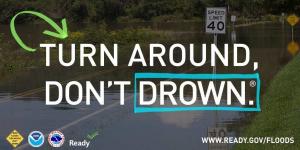Flood Safety
 How can you protect yourself and your family during a flood?
How can you protect yourself and your family during a flood?
Follow these simple, common-sense rules.
- Do not drive through a flooded area. More people drown in cars than anywhere else. Do not drive around barriers! ;
- Do not walk through flowing water. Currents can be deceptive and flowing water that is only 6 inches deep is enough to knock you off your feet! ;
- Stay away from power lines and electrical wires. If your house is about to be flooded, turn off the power at the service box. Electrical current can travel through water. Electrocution is the 2nd leading cause of death during floods;
- Be alert for gas leaks. Turn off the gas to your house before it floods. If you smell gas, report it to a Township official or your gas company. Do not use candles, lanterns or open flames if your gas has been shut off;
- Keep children away from flood waters, ditches, culverts and storm drains. Flood waters can carry unimaginable items that have been dislodged. Culverts may suck smaller people into them rendering them helpless;
- Clean everything that has been wet. Flood water will be contaminated with sewage and other chemicals which may pose severe health threats;
- Look out for animals, especially snakes and rodents. Small animals that havve been flooded out of their home may seek shelter in yours! ;
- Do not use gas engines such as generators or charcoal fires indoors during power outages. Carbon monoxide exhaust can pose serious health hazards.
How can your protect your property?
- Elevate your structure above the flood hazard elevation so that flood waters flow underneath and not into the structure;
- Install a sump pump to dispose of infiltrating water to grade outside of the structure;
- Watertight seals can be applied to brick and block walls to protect against low-level flooding;
- Utilities such as HVAC equipment, water heaters and other major appliances can be elevated to higher floors in the structure or on platforms;
- Temporary measures such as moving furniture and other valuables to higher floors or sandbagging exterior openings may also help;
- Removing important items from flood-prone basements to minimize damages;
- Installing battery or backup generator systems to run sump pumps in case of power failure.
Illegal dumping can make floods worse!
- Do not dump anything in catch basins, ditches, streams or rivers. Dumping violates Township and State regulations and can add to the amount of material transported during a flood and can make floods worse by clogging important drainage paths. Everything can contribute to flooding including trash, yard or gardening waste such as leaves, grass clippings, and branches, and construction debris to name a few. If you see anyone dumping material, please contact the Public Works Department or the Police Department.
Visit ready.gov/floods for more information on how you can be safe during a flood.
Updated March 19, 2020
